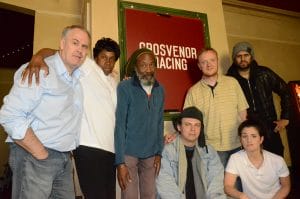Gavin Dent directs Justin Hopper’s new play Flutter at Soho Theatre Upstairs, a funny and vivid exploration of everyday life, seen through the lens of an independent betting shop. Justin Hopper has written extensively for film, television, and radio.
A life-long punter and habitué of betting shops, Flutter is Hopper’s first stage play. It was initially performed as part of the Wandsworth Arts Fringe 2017 and received a grant from the Arts Council and Wandsworth Council as well as sponsorship from the Racing Post newspaper. We caught up with Justin to find out more.
Flutter is at Soho Theatre 11th – 16th June 2018.
What can you tell us about Flutter?
The play focuses on the staff and customers of an independent betting shop that is threatened with closure or takeover by a bigger chain. The shop has become a surrogate home, refuge and in some cases a prison for the people that go in there. The drama looks at how they react to the change forced on them. Gambling lies at the heart of heart of the show — lots of the characters will gamble at the drop of a hat but are unprepared to take any risks in their personal lives. They are all on a journey of learning how to balance risk against reward.
Why did you decide to write your first stage play after writing for TV?
I’ve had a slightly back-to-front writing career. After graduating from the NFTS I started off writing for film and television but found that increasingly frustrating. I was lucky enough to be commissioned to write several BBC radio dramas and found them a real eye-opener. You are much more closely involved with the production process, and the actors give you what amounts to a private performance in the recording studio.
From then on it seemed a natural progression to start writing for the stage, which is the creative form I’ve always loved the most. Most writers begin by writing fringe plays and then graduate to the screen. I’ve just done it the other way around.
Do you have to change the way you approach writing when it’s for the stage?
Not really, although dialogue obviously drives the action more than it might do in screen drama. I did adopt a very inclusive tone in this play though. In collaboration with the Racing Post we’ve run a grass roots campaign to try and get betting shop punters into the theatre. The tone of the play needs to appeal to them as well as regular theatre-goers. It’s a delicate balancing act, it can’t be too Chekhov or too Eastenders. But I hope we pull it off.
Why do you think a betting shop makes such a good setting for a play?
Lots of reasons. Firstly I was drawn to the rhythms of a betting shop. It’s a place of constant, almost balletic movement as punters look up form, put on bets, watch the screens, collect their winnings and prepare for the next race. I wanted the play to capture some of the energy of that. Secondly, it’s a really diverse environment, where you find all ages and all ethnicities.
 There might be a pensioner betting pennies, an office worker in for a lunchtimes flutter or compulsive gambler who has just stuck his entire weekly wage in a betting machine. So you find dramas big and small. And lastly I think of bookies as a unique British high street institution, in many ways reflecting the direction of travel of UK society.
There might be a pensioner betting pennies, an office worker in for a lunchtimes flutter or compulsive gambler who has just stuck his entire weekly wage in a betting machine. So you find dramas big and small. And lastly I think of bookies as a unique British high street institution, in many ways reflecting the direction of travel of UK society.
At one time they were more like working men’s clubs, full of smoke and quite intimidating to outsiders. Now gambling is mainstream, with ads for bookmakers on TV and comfy seats and endless free teas in the shops. But the sense of the shop as the hub of a small community space is often lost, and despite the nicer surroundings bookmakers can be much more edgy places now — especially when a punter who has just stuck £500 in a video roulette machine comes back in and smashes it up with a lump hammer! (something I’ve witnessed)
Are the setting and characters based on places and people you know?
Yes. Lots of the things that happen in the play are based on punters I’ve known, shops I’ve betted in and situations I’ve witnessed over the years. The most extreme incident was when the elderly punter next to me keeled over and had a heart attack after his horse won. The manager, cashier and myself all tried to help him while one punter continued to watch a race and another stood at the counter waiting to be paid out. Every emotional reaction was covered in that incident.
How do you think Flutter will change people’s perceptions of a betting shop?
The recent debate over Fixed Odds Betting Terminals means many people think of betting shops like crack-houses, full of dead-eyed staff intent on robbing gambling addicted punters blind. But for the majority of customers that’s simply not the case. Many older people, who might otherwise feel socially excluded, go into betting shop for companionship and a sense of community, strange though that might sound. And I know plenty of betting shop managers who function as virtual agony aunts. Flutter shows the good as well as the bad, and provides a much more nuanced look at the betting shop environment.
Any tips on how to spot a winner?
You just have to use your eyes. The best way to make money from betting is to look for value in the market — a horse that in your opinion has been priced up at longer odds than you think it should be. Of course, everyone else is looking for value too. But there’s no replacement for watching races, and getting that gut feeling that a horse is going to run better than its odds dictate. Then you have to have the nerve to bet on it

















